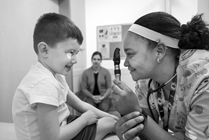Search Results
Viewing: 31-40 of 1460 | All
Article
Hospital Admission for COVID-19
This Helping Hand™ covers what to expect when your child is admitted to the hospital for COVID-19 (Coronavirus Disease 2019). This includes information about visitors, personal protective equipment (PPE), and preventing the spread of COVID-19.

Article
Eye Surgery Under Anesthesia
This Helping Hand™ is about how to prepare for eye surgery under anesthesia.
Article
Tummy Time
It is important for babies to sleep on their backs to reduce the risk of Sudden Infant Death Syndrome (SIDS). However, a baby needs time on his or her tummy for stretching and strengthening his back and neck muscles.
Article
Osteopathic Manipulative Medicine
Osteopathic Manipulative Medicine (OMM) is a set of hands-on techniques. They are used to ease pain, calm the nervous system and improve a variety of symptoms. This lets the body function better and move more easily to help your child feel better.
Article
Inhalers: Spacers
Many medicines that help make breathing easier are taken by an inhaler. The inhaler must be used the right way, or the medicine will not get into the lungs to make your child feel better. A spacer is a device that helps the medicine get into the lungs.
Article
Burns: Wearing a Pressure Garment
This Helping Hand™ is about using pressure garments after a burn to help reduce scaring.
Article
Eye: Tear Duct Massage
Tear duct massage is a way to help to open the duct and let the tears flow into the tear sac.
Molluscum
Molluscum are smooth, pearly, skin-colored, benign bumps on the skin. They begin as small bumps and they may grow as large as a pencil eraser.
Article
Cardiopulmonary Resuscitation (CPR): Age 1 to Puberty
This Helping Hand™ is a guide to general CPR for children that are over 1 year old and have not gone through puberty. It is not intended to be used as training material or in place of formal CPR training.
